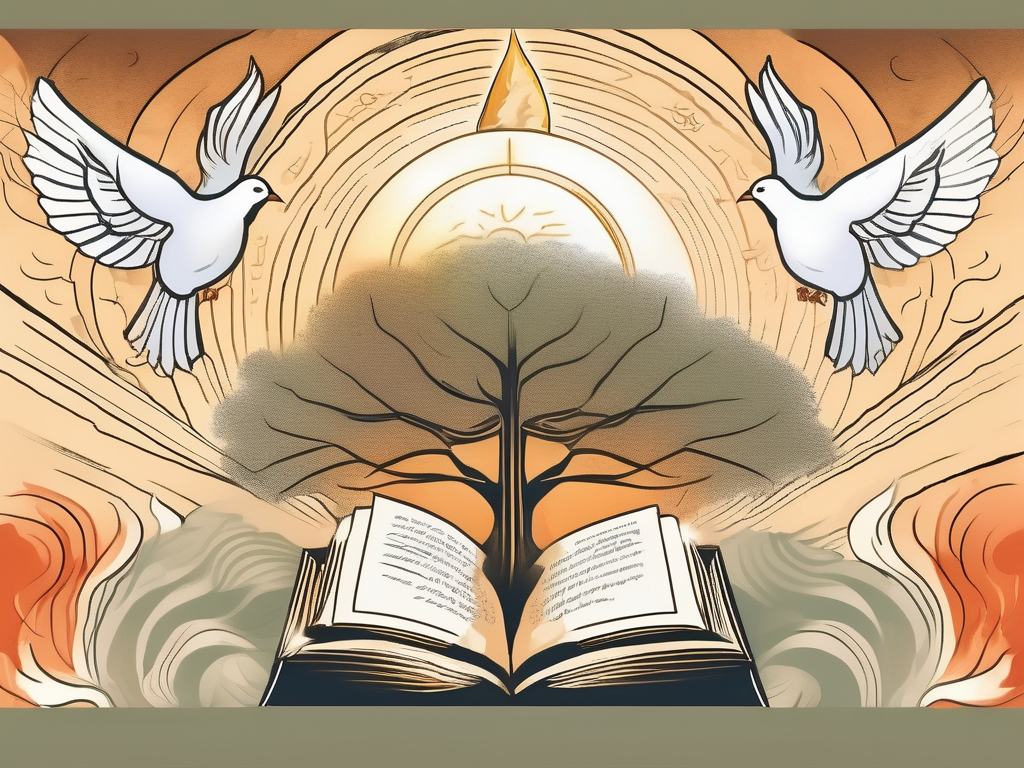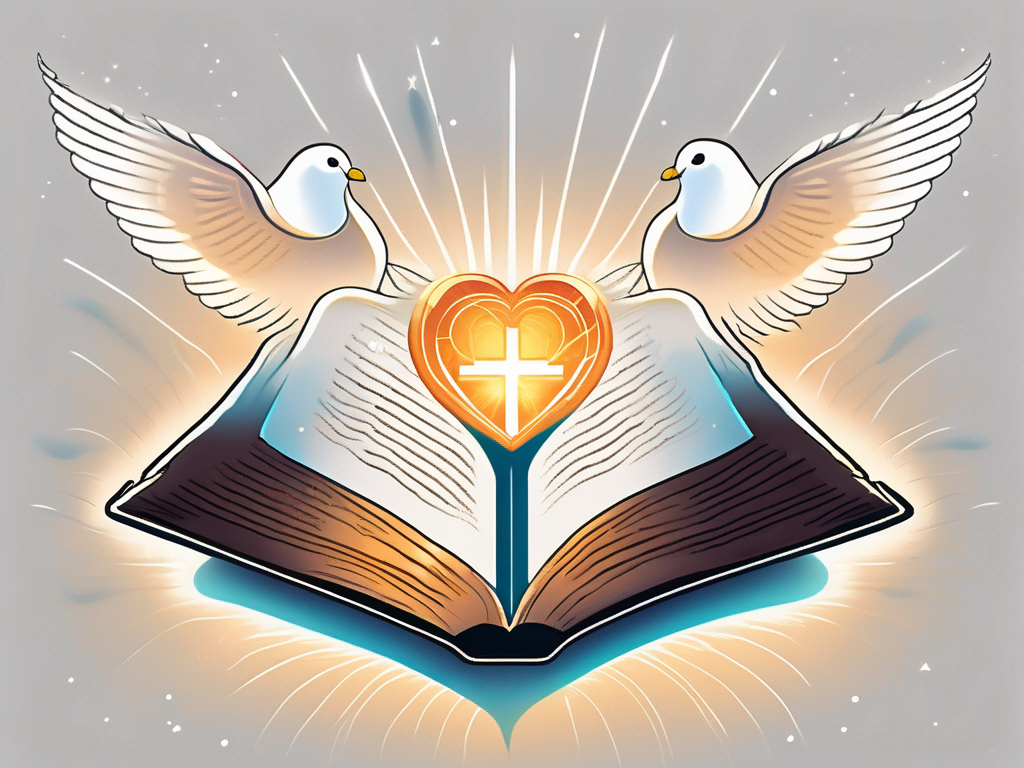Prophets play a significant role in the Bible, and their presence is felt throughout both the Old and New Testaments. In this article, we will explore the purpose and characteristics of biblical prophets, examine the messages they conveyed in both the Old and New Testaments, and consider the interpretation and controversies surrounding the prophetic gifts. Additionally, we will address the relevance of biblical prophets today and how their teachings can be applied in modern times. Let’s dive in!
Understanding the Role of Prophets in the Bible
Before we delve into the specifics, it’s important to comprehend the significance of prophets in Scripture. In simplest terms, a prophet is someone who is divinely chosen to speak on God’s behalf. They are appointed as intermediaries between God and the people, delivering messages, warnings, and guidance.
Prophets played a crucial role in the spiritual landscape of ancient Israel. They were not just ordinary individuals; they were chosen by God Himself to fulfill a unique purpose. Their calling was to be the voice of God in a world that often turned away from Him.
Throughout history, prophets emerged in different periods, each with their own message and mission. From Moses, who led the Israelites out of Egypt, to Elijah, who confronted the prophets of Baal, and Isaiah, who prophesied about the coming Messiah, these individuals left an indelible mark on the biblical narrative.
The Purpose of Prophets According to Scripture
What was the purpose of prophets? The Bible tells us that prophets were called to fulfill various roles. One primary aim was to call people to repentance, speaking truth when society strayed from God’s will. Prophets also served as messengers, bringing God’s word directly to individuals, kings, and even nations. Time and time again, we witness them proclaiming God’s judgments, foretelling future events, and offering hope for redemption.
Their messages were not always easy to deliver. Often, prophets faced resistance and rejection from those who did not want to hear the truth. Jeremiah, known as the weeping prophet, experienced intense opposition as he warned the people of Judah about the impending destruction of Jerusalem. Despite the hardships they faced, prophets remained steadfast in their mission, faithfully delivering God’s message to the people.
Furthermore, prophets were not limited to delivering messages of doom and judgment. They also brought words of comfort and hope. Isaiah, for example, prophesied about the coming of the Messiah, offering a glimmer of hope to a nation in despair. Through their prophecies, prophets provided guidance, direction, and assurance to the people of God.
The Characteristics of Biblical Prophets
Biblical prophets possessed distinct traits that set them apart. They were often courageous individuals who boldly honed their voices, even when faced with opposition and persecution. They demonstrated unwavering faith and remained dedicated to their divine calling, regardless of personal sacrifice. Prophets were also known for their intimate relationships with God, frequently seeking His guidance through prayer and meditation.
Elijah, for instance, displayed great courage when he confronted the prophets of Baal on Mount Carmel. Despite being outnumbered and mocked, he fearlessly called upon God to prove His power. Through this act, Elijah demonstrated his unwavering faith and trust in the Almighty.
Moreover, prophets were not just messengers; they were also called to live out their messages. They often used symbolic actions to convey their prophecies. Ezekiel, for example, was instructed by God to lie on his side for a certain number of days as a sign of the impending judgment upon Israel. These symbolic acts served as powerful visual representations of the messages they were delivering.
In conclusion, prophets played a vital role in the biblical narrative. They were chosen by God to speak on His behalf, delivering messages of judgment, warning, and hope. Their unwavering faith, courage, and intimate relationship with God set them apart as extraordinary individuals. Through their prophecies, they called people to repentance, offered guidance, and foretold future events. The legacy of the prophets continues to inspire and challenge believers today.
Old Testament Prophets: Their Messages and Impact
The Old Testament features a rich tapestry of prophetic voices that shaped the course of history. These prophets were chosen by God to deliver His messages to the people of Israel, guiding them, warning them, and offering them hope. Their words were recorded and preserved, becoming a testament to their profound impact on the nation and the world.
We can categorize these prophets into two groups: major and minor. The major prophets, including Isaiah, Jeremiah, and Ezekiel, held prominent roles in delivering God’s messages. Their prophecies were often lengthy and detailed, addressing the current state of affairs and offering glimpses into the future.
Major Prophets in the Old Testament
Isaiah, known as the “Prince of Prophets,” was a powerful voice during a time of political turmoil. His prophecies provided profound glimpses into the coming Messiah and the times of peace that would follow. Isaiah’s words offered comfort and hope to a nation in distress, assuring them of God’s faithfulness and His plan for their redemption.
Jeremiah, often referred to as the “Weeping Prophet,” had the challenging task of warning the people of Israel about the impending exile. His messages were filled with sorrow and urgency, calling the people to turn back to God and repent of their sins. Despite facing rejection and persecution, Jeremiah remained faithful to his calling, delivering God’s words with unwavering conviction.
Ezekiel, a prophet of vivid visions and symbolic actions, depicted the restoration of Israel after captivity. His prophecies were filled with imagery and symbolism, capturing the attention of the people and conveying powerful messages. Through his unique style, Ezekiel emphasized the importance of repentance and the hope of a renewed relationship with God.
Minor Prophets in the Old Testament
While the minor prophets may have had shorter writings, their impact was no less significant. These prophets, including Hosea, Amos, and many others, addressed various themes such as justice, repentance, and mercy. Their words served as a reminder of God’s expectations for His people and the consequences of disobedience.
Hosea’s life became an allegory for God’s faithfulness towards an unfaithful Israel. Through his personal experiences, Hosea demonstrated the depth of God’s love and His willingness to forgive. His message resonated with the people, urging them to turn away from their idolatry and return to the one true God.
Amos, a shepherd turned prophet, denounced social injustice and the neglect of the poor. His words were a wake-up call to a nation that had become complacent and indifferent to the suffering around them. Amos challenged the people to examine their hearts and their actions, urging them to seek justice and righteousness.
The minor prophets, each with their unique style and message, offered valuable insights into the spiritual and moral condition of the nation. Their words served as a reminder of God’s expectations and His desire for His people to walk in His ways. Through their prophecies, they called the nation to repentance and offered hope for a renewed relationship with God.
New Testament Prophets: Their Contributions and Significance
The New Testament introduces a fresh perspective on prophets, particularly within the context of Jesus’ ministry and the early church.
Prophets played a crucial role in the New Testament, serving as messengers of God’s word and guiding the people towards spiritual truth. Their contributions and significance cannot be overstated, as they helped pave the way for the coming of the Messiah and continued to play a vital role in the growth and development of the early church.
Prophets in the Gospels
During Jesus’ time, prophets continued to fulfill their essential role. John the Baptist, a prominent figure in the Gospels, proclaimed the coming of the Messiah and called people to repentance. His powerful message resonated with many, as he urged them to turn away from their sins and prepare their hearts for the arrival of the long-awaited Savior.
John the Baptist’s prophetic ministry was not only significant in terms of preparing the way for Jesus, but it also highlighted the continuity between the Old Testament prophets and the new era of redemption that Jesus was ushering in. By baptizing people in the Jordan River, John symbolized the cleansing and renewal that would come through the Messiah’s work.
It’s worth noting that Jesus Himself was considered a prophet, as He spoke with the authority and wisdom of God. Throughout His ministry, Jesus delivered powerful teachings, performed miraculous signs, and revealed divine truths to His disciples and the crowds that followed Him. His prophetic ministry not only confirmed the words of the Old Testament prophets but also brought a new revelation of God’s love, grace, and salvation.
Prophets in the Epistles
In the early church, the gift of prophecy remained influential. The apostle Paul, in his letters to the Corinthians and Ephesians, discusses the prophetic gifts and their significance for the edification of the body of Christ. Paul recognized the importance of prophecy in building up the believers and encouraging them in their faith.
Paul emphasized that the gift of prophecy was not limited to predicting future events but also encompassed the ability to speak forth God’s truth, provide wisdom, and encourage fellow believers. The prophetic gifts were essential for the growth and unity of the church, as they brought divine guidance, correction, and encouragement to the believers.
Furthermore, Paul highlighted the need for discernment in evaluating prophetic messages. He urged the believers to test the spirits and weigh the words of the prophets against the teachings of Scripture. This emphasis on discernment ensured that the prophetic gifts were used in a way that aligned with God’s truth and brought edification to the church.
In conclusion, the New Testament presents a rich and diverse picture of prophets and their contributions. From John the Baptist, who prepared the way for Jesus, to the prophetic gifts in the early church, these individuals played a vital role in proclaiming God’s truth, guiding the people, and building up the body of Christ. Their significance cannot be underestimated, as they helped shape the course of salvation history and continue to inspire believers today.
The Prophetic Gifts: Interpretation and Controversies
As with any spiritual gift, the interpretation and application of prophetic gifts have sparked debates and controversies throughout history.
The Gift of Prophecy in Biblical Context
Understanding the gift of prophecy necessitates examining the biblical context. Prophecy involves conveying God’s message based on the revelation received. It is important to discern between personal opinions and the actual words from God. Prophetic words should align with Scripture and be tested by the community of believers.
Debates and Misunderstandings About Prophetic Gifts
Unfortunately, misunderstandings and misuse of the prophetic gifts have at times given rise to skepticism and divisions within the church. It is crucial to approach the topic with discernment, recognizing that not all who claim to have prophetic gifts are genuinely speaking on God’s behalf. Seeking guidance from spiritual leaders and studying the Scriptures can help navigate these complexities.
The Relevance of Biblical Prophets Today
Some might wonder if the words of ancient prophets still hold relevance in our modern world. The answer lies in the eternal truths found within their messages.
Applying Prophetic Teachings in Modern Times
Although the cultural and historical contexts may differ, the core teachings of the prophets remain invaluable. Their calls for justice, compassion, repentance, and faithfulness to God resonate across time. By studying their words, we can glean timeless principles and apply them in our daily lives, seeking to bring about positive change in our communities and relationships.
The Role of Prophets in Contemporary Faith Communities
While we may not encounter prophets in the same capacity as in biblical times, contemporary faith communities still value individuals who possess prophetic gifts. Those gifted with insight, wisdom, and a deep understanding of God’s Word contribute to the spiritual growth and well-being of the church. Prophetic voices can inspire and challenge us to live in accordance with God’s purposes, fostering a vibrant and dynamic faith community.
In conclusion, the Bible offers a rich tapestry of insight into the role of prophets. Their purpose, messages, and impact span both the Old and New Testaments. Today, as we explore their teachings, let us be open to the guidance and wisdom they offer, recognizing their continued significance in shaping our faith journeys.












